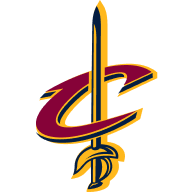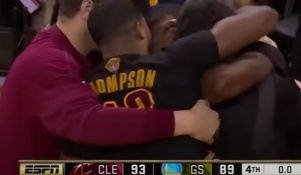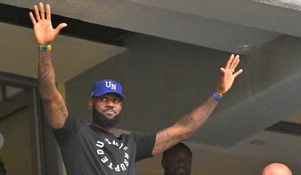LeBron Flying High Next to Air Jordan
Since he retired in 2003, Michael Jordan has been the gold standard of basketball. He is a man elevated to a pedestal that is proclaimed by many to be unreachable, a man with the perfect career, the face of basketball that will transcend eras, universally accepted as the greatest of all time. People insist with the utmost zeal that Jordan cannot and will not ever be passed. The truth is that Jordan is not in fact unpassable. For now, he sits alone atop the basketball world, but that reign is by no means definite, and it might come to an end pretty soon. The evidence is right in front of our eyes.
LeBron James has done his best to dispel the Jordan comparisons. He has made it clear that he is constantly chasing the “ghost” of Mike, but that he is nothing like him.
“Our games are just different,” says King James. “His body is different; my body is different than his. You recognize the dominance that someone had at that age, but there’s no similarities in our game, at all.”
As much as their styles of play differ, the comparison is and should be prevalent. After all, if LeBron is chasing Jordan, people will inevitably stack their careers up against each other. And when they do, it might appear a lot closer than people think. Today is LeBron’s 32nd birthday, and what a career he has had for a guy who clearly has a lot left in the tank. When you stack up the numbers from LeBron on his 32nd birthday with Jordan on his, LeBron has the clear advantage.
LeBron Jordan
27,544 Points 21,541
7,289 Rebounds 4,219
7,057 Assists 3,935
1,696 Steals 1,815
790 Blocks 684
To take these numbers at face value would be silly considering the fact that LeBron has played five more seasons and 348 more games than Jordan at each of their 32nd birthdays, so here are the per game values:
LeBron Jordan
27.1 PPG 32.3
7.2 RPG 6.3
7.0 APG 5.9
1.7 SPG 2.7
0.8 BPG 1.0
The numbers are virtually a wash, and per game values are a better way of determining value at the time both players were on the court, but it diminishes the fact that LeBron has played five more years. That’s something that shouldn’t be taken away from him, and when both players decide to hang it up, LeBron will have five more years of extended dominance that Jordan simply didn’t have. Barring injury, there is no reason to believe that LeBron won’t play six more years like Jordan did after his 32nd birthday, so LeBron’s reign over the NBA will last much longer, something that should be a notable factor in this comparison.
However, it’s not the numbers that are used to back up the Jordan argument. Michael Jordan isn’t considered the best player of all time because his per game numbers dictate so. It isn’t his five MVP awards either, a number that LeBron is one away from tying. What makes Michael so great is his ability to win championships. In six finals appearances, Jordan’s Bulls won the title all six times, an amazing feat by any stretch, and that is the reason people believe he is untouchable, specifically in LeBron’s case. It's also where the fallacy lies.
LeBron James has seven finals appearances and three wins. He has the same number of championships that Michael had when he turned 32. He also has four more finals appearances. If LeBron had only three finals appearances, all victories, people would likely be more willing to concede that he can unseat Jordan. The idea of a perfect finals record is nothing but a made-up standard. By saying that three for three in the finals is better than three for seven, one is penalizing LeBron James for advancing further in the playoffs. If the year Miami lost to the Mavs, LeBron and the Heat had lost in the conference finals to Chicago, he would have one less finals loss. If he had lost in the conference finals or earlier in all the years his team made the finals and came up short, he would have a perfect finals record and we would all be singing his praises because of it. The very idea that we penalize a player for making it to the finals and losing more so than we do for not making it to the finals at all is ludicrous. Three championships in seven appearances is better than three championships in three appearances.
When Michael Jordan returned to basketball for the last 17 games of the 1995 regular season, the Bulls were a playoff team in the Eastern Conference at full strength. Jordan was once again playing his best basketball, dropping 55 in Madison Square Garden just ten days after his return. Yet Shaquille O’Neal and the Orlando Magic made quick work of the Bulls in the conference semifinals. If the Bulls had beaten Orlando in that series, and gone on to beat Indiana before losing to Hakeem Olajuwon and the Houston Rockets in the championship, Jordan would have no perfect finals record, and his legacy would somehow be tarnished by winning two major NBA playoff series. The notion that losing before the finals is more impressive than winning a series and losing in the next round or two makes no sense. A perfect finals record is merely a nice story, but it isn’t all it’s cracked up to be.
Perhaps the most telling metric of all is to look at what happens when these superstars left their teams, because they both did in the height of their career. LeBron left the Cavs after a 61-win season. He had such little help in Cleveland that the acquisition of Antawn Jamison was considered a major move for the Cavs. Can you imagine Antawn Jamison being the second best player on a finals team now? He’d be the sixth best player on Golden State. When LeBron left, the Cavs went from a 61-win team to a 19-win team and the number one overall pick. When he left Miami four years later, the Heat went from a team that made four straight finals to a team that missed the playoffs, even with Wade and Bosh still on the roster. When Jordan left the Bulls for baseball in 1994, Chicago went from 57 wins to 55. That’s a two-win difference. Chicago lost in the second round, the same fate they faced a year later when Jordan returned for those who like to pretend that the Bulls would have won eight in a row if Jordan hadn’t left basketball.
Michael Jordan is the best player of all time. Some people say that with more confidence than I do. But LeBron is not far behind. He and the Cavaliers just took down a superteam in a career-defining moment, and after Golden State added one of the best players in the world in Kevin Durant to create a bigger superteam, LeBron beat them on Christmas day. If he can pull it off again in June, he won’t need to chase Jordan anymore. With four rings in eight appearances and many years left to go being the best player in basketball, I will have no trouble saying that LeBron is the best player in NBA history. For now, just enjoy his greatness.







